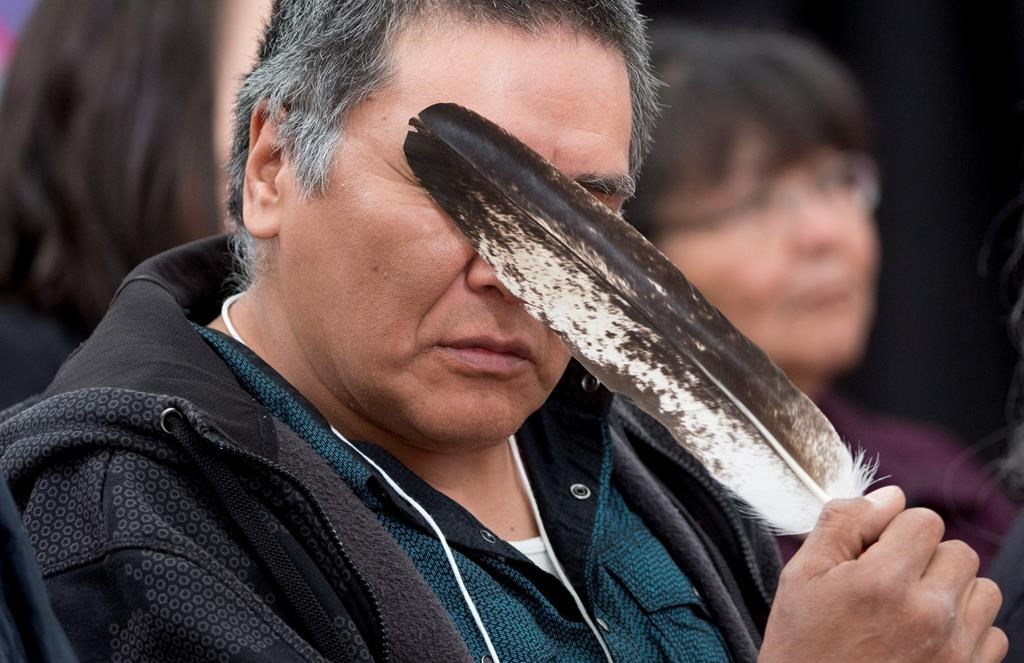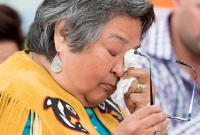Support strong Canadian climate journalism for 2025
Families of missing and murdered indigenous women told a national inquiry on its final day of hearings in Whitehorse that they have little faith in the process and their trust must be earned.
The emotional hearings ran for three days and heard from dozens of family members of girls or women who have disappeared or been killed. Each story was unique, but the '60s Scoop, residential schools and police indifference were constant themes.
On Thursday, testimony took a more critical turn at times, with some speakers expressing wariness of the inquiry and urging the commissioners not to let them down.
"I really don't trust people like you guys," said Terry Ladue, the microphone shaking in his hand.
Ladue said his mother Jane Dick was beaten to death after he and his siblings were seized in the '60s Scoop, when indigenous children were taken and placed in non-indigenous homes. He said the effect was that he never learned how to love and spent 13 years "with a needle stuck up his arm."
He said he doesn't trust the inquiry because all government has ever done is hurt him, take him away from his parents and throw his people in jail. Ladue urged the commissioners to do more than just talk — they must take action to elevate indigenous people in Canadian society, he said.
"Dealing with this today, for me, is letting go of something that I haven't let go of for 52 years, and that's the anger I have towards the government officials and the anger I have towards the RCMP.
"I don't trust. You want my trust, you've got to earn my trust. If I see this fall apart, I'll never trust again."
Several listeners, including commissioner Qajaq Robinson, were crying by the end of Ladue's testimony.
Chief Commissioner Marion Buller has said it's crucial to the future of the inquiry that the Whitehorse hearings are successful. Other community meetings won't be held until the fall, and families from across the country have been critical of delays and poor communication.
Buller choked up as she delivered closing remarks, saying the spirits of missing and murdered women and girls joined the hearings.
"In three days we've heard many stories of loss, we've heard anger, we've heard pain, but we've also heard courage and strength and hope," she said.
"But perhaps the most moving thing of all that's happened is the magic of the healing that's started. You can feel it here."
In addition to the public hearings, where families of 14 missing or murdered women and girls spoke inside a large white tent decorated with colourful blankets, a number of participants spoke privately with statement-takers.
Shaun LaDue, who uses a capital "D" in his last name unlike his brother, said he felt respected and heard after testifying about their mother. He also spoke about his experience as a transgender man.
"The hearings so far to me seem to be going very good. The commissioners are listening to us with their heart and their soul and they're very responsive to what the Yukon First Nations families have to say," he said in an interview.
"I have good hope — a big, strong hope — that when they go across Canada, people will see that they're working their hardest."
Joan Jack, a lawyer and sister-in-law of murder victim Barbara Jack, has criticized the quasi-judicial format of the inquiry. She told reporters earlier Thursday that the formal processes, including the swearing-in of witnesses, were making many participants uncomfortable.
But as her family rose to speak Thursday afternoon, they were not asked to swear to tell the truth. Instead, they were dressed in red Tlingit regalia, which means they were "standing in their truth," she said.
A lawyer approached her family in the morning to say that the commissioners understood her concerns, Jack said in an interview.
"I think the commission responded to my public criticisms that using the Canadian legal system and filling it with brown people isn't sufficient. We have to do it different," she said.
Inquiry spokeswoman Bernee Bolton said that under Yukon law, there is flexibility in how people are sworn in that reflects cultural diversity.
Jack said she still has concerns about the inquiry, including that the lead legal counsel is not aboriginal.
"I don't have a lot of faith that this process is going to produce anything," she told the commissioners.
"That's why I said to my family, 'Why should we come?' I said, 'Because we'll heal ourselves. If anything, we can find reconciliation within our family.' "





Comments